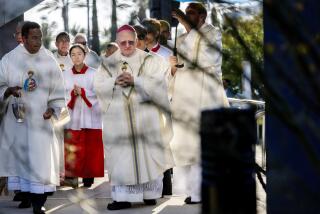‘Money Walks,’ Chapter 1
This is the first chapter in an experiment in serial storytelling called “Money Walks” that we will publish in Calendar during the next three weeks. Every weekday and Saturday between now and April 24, we will bring you another installment, first by our own Mary McNamara, and then by Los Angeles fiction writers including, among others, Seth Greenland, Marisa Silver, Aimee Bender, Denise Hamilton and Jerry Stahl.
Although the Rev. Franco Laguna had spent years preaching the spiritual pitfalls of equating riches with value, he was strangely unprepared to learn that the money was gone.
“What money?” he said, blinking into the dusty morning light that slipped through the Venetian blind across from his desk and directly into his eyes.
“The money,” the church treasurer repeated, with a rising note of exasperation. Maureen was a perilously efficient woman of 43 who had five children; organized exasperation was her default setting. “The church money.”
“Well, which part of the church money?” the priest asked patiently.
“All of it.”
Maureen was a pretty woman, blond and blue-eyed, but too tall and thin for Franco’s taste, and with a quivering sharpness; when she walked, he sometimes thought he could hear the sunlight, the breeze, the atoms of the air scream as they were shorn in two.
“Are we talking about a petty theft, have we lost a loan or has the stock market taken another nose dive?”
Holy Redeemer Episcopal Church of Los Angeles was not a particularly wealthy parish, at least not in comparison to some of its neighbors to the west. Holy Redeemer was solidly middle class, which had proved a blessing in the past year or so; while various stock scandals and failures had stripped millionaires of their fortunes, many in his flock had remained relatively untouched. So when a few of the church’s more adventuresome investments suffered significant downturns, he had been able, in good conscience, to ask that they make up the difference. Which, for the most part, they had. But now, watching his normally unflappable treasurer, Franco, as he liked to be known, felt a qualm.
“I don’t know,” Maureen answered, her voice quavering. “It’s just gone. At first I thought it was just some online glitch with the mutual funds, but then I went through all the accounts and” -- she put a hand on the priest’s desk to steady herself -- “it’s all gone.”
“Maureen,” he said gently, “that isn’t possible.”
“All things are possible,” she said with a brittle laugh. “Isn’t that what you tell us? And it’s not just us. It’s all over the news. All the money, everyone’s money is . . . gone.”
Mutely, she moved to his side of the desk and flipped open his laptop. CNN, MSNBC, the Los Angeles Times . . . all were a mishmash of headlines and news crawls. All over the country, bank accounts, mutual funds, CDs and trust funds were flatlining. Some blamed technology; others saw it as a final adjustment, a systemic, perhaps even mystic rebooting after all these months of financial woe. A few wondered if a brilliant hacker had somehow infiltrated a financial master frame.
After a few moments, Franco lifted himself out of his chair and went to sit in the church courtyard. After weeks of rain, the weather had grown suddenly warm and the Victorian boxwood had begun its heady nocturnal bloom.
The money had been slipping away for some time now, he realized, slipping away from everyone, with their credit cards and automated bill-pays, as if it had never existed at all.
But it had. He remembered the damp and crumpled dollar bills he had hoarded as a child, money from the tooth fairy and mowing lawns, from his Confirmation and birthday cards. They had existed, though he could not for the life of him remember what he had used them for.
In his pocket, his cellphone buzzed. Soon the calls would come one after another, and then the church would fill with anxious people looking for solace. The church was no longer the first place people turned to in times of crisis, but after all the other options had been exhausted -- the brokers, the advisors, the authorities, friends and family -- here is where they would come.
Franco became aware that Maureen had sat down beside him. With a smile he hoped contained some comfort he put his hand over hers in a gesture of solidarity.
“What should we do?” she asked, and he could see fear in her eyes.
He smiled again. “We will do our work,” he said. “And await further instruction.”
More to Read
The biggest entertainment stories
Get our big stories about Hollywood, film, television, music, arts, culture and more right in your inbox as soon as they publish.
You may occasionally receive promotional content from the Los Angeles Times.











